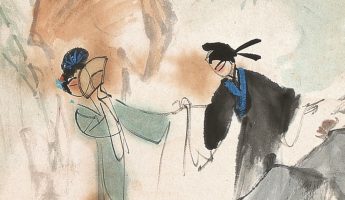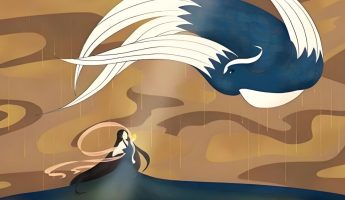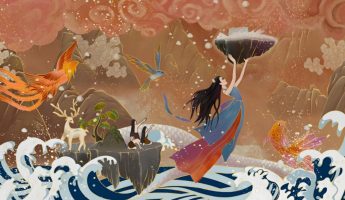In ancient times, the first king of Shu was Silkworm Grove. He taught the people how to raise silkworms, which gradually developed the sericulture industry in Sichuan. Later, the Shu Kingdom experienced the rule of kings such as Bai Guan and Yu Fu. I don’t know how many years passed, but a young man named Du Yu descended from the sky to the land of Shu and became the king of Shu, known as Wangdi. Emperor Wang was very concerned about the lives of the people, teaching them how to grow crops and urging everyone to follow the farming season and do a good job in production. Therefore, he was deeply loved by the people.
One year, the Shu Kingdom suffered a great flood, causing great harm to the people. Just then, a man named Bie Ling from the State of Chu drifted to the land of Shu due to a slip and was rescued by Emperor Wang. Emperor Wang saw that the turtle spirit spoke exceptionally well, so he appointed him as prime minister and entrusted him with the important task of water management. Bieling lived up to the expectations of the people, led the people to control the flood, opened Wushan, and made the water flow smoothly into the Yangtze River, so as to relieve the flood, and the people of Shu lived and worked in peace and contentment again.
After Bieling successfully controlled the water, Emperor Wang felt that he had made great contributions, so he voluntarily abdicated the throne to Bieling and lived in seclusion in Western Mountain (today’s Qingcheng Mountain). This action demonstrates the great selflessness and high integrity of the Wangdi.
Although Wangdi left the throne, he still cared about the people of Shu in his heart. After his death, his soul transformed into a cuckoo bird. Every year during busy farming seasons such as Qingming, Guyu, Lixia, and Xiaoman, cuckoo birds fly to the fields and chirp repeatedly, reminding people to seize the farming season and improve production. People therefore call the cuckoo bird Du Yu bird, Zi Gui bird, or Cui Gui bird. When cuckoos sing, the people of Shu will think of their Wangdi Du Yu and feel his deep attachment to the country and people.
The story of Wangdi transforming the cuckoo is widely spread among the people, not only because it is full of mystery and romantic feelings, but also because it embodies Wangdi’s selfless dedication and noble qualities of caring for the people. This legend has also been recited and praised by literati and poets throughout history, becoming a brilliant pearl in the treasure trove of Chinese literature. As the Tang Dynasty poet Li Shangyin wrote in his poem “Jin Se”, there is a famous line that goes, “In the spring heart of Wangdi, I hold the cuckoo.” He uses the allusion of Wangdi transforming the cuckoo to express his grief and sorrow. The story of Wangdi Huajuan is a legend about dedication, sacrifice, and love. It shows us the image of a monarch who cares about the people and is selfless, as well as his deep affection for the country and the people. At the same time, this story also embodies people’s yearning and pursuit for good morals and emotions.



